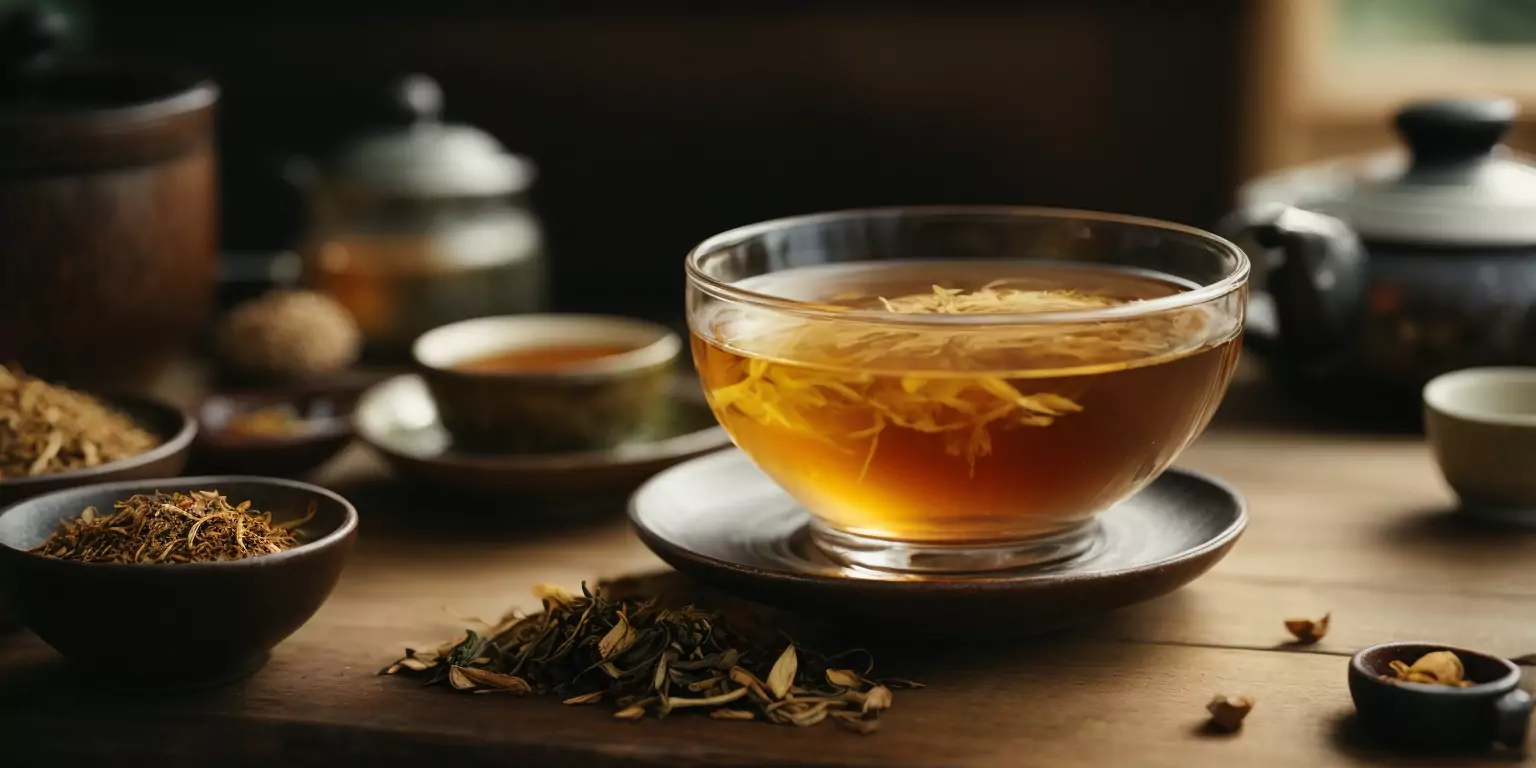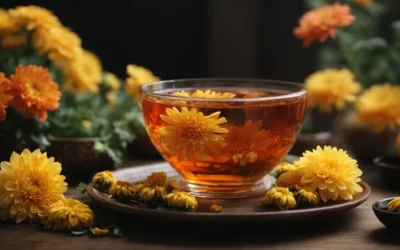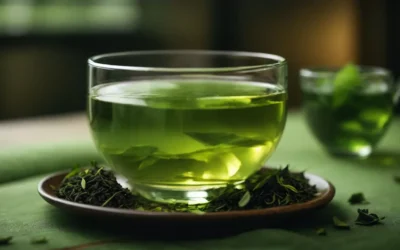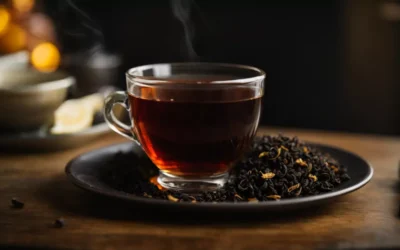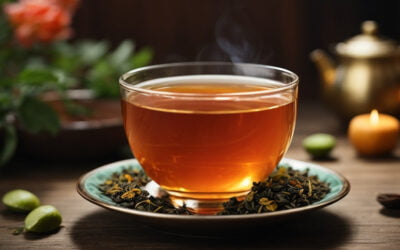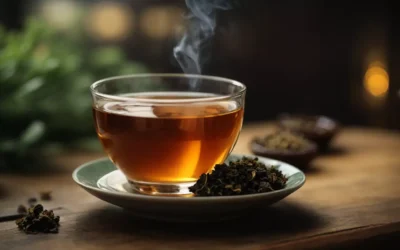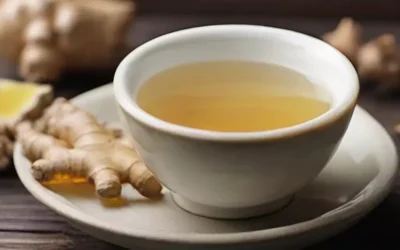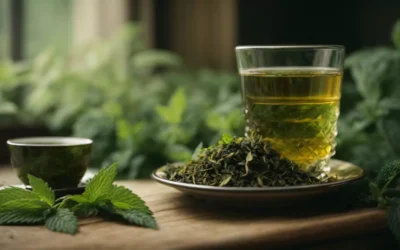Ginseng tea, a popular herbal drink, is known for its numerous health benefits, thanks to its ginsenoside content. This antioxidant-rich beverage offers excellent protection and can be enjoyed as a natural supplement. Originating from ancient cultures, ginseng tea, a popular drink, holds significant cultural and medicinal value due to its ginsenoside extract.
Many people also choose to take ginseng supplements for its various health benefits. This blog post will delve into the rich history, uses, and potential health advantages of oriental ginseng, a remarkable drink known for its antioxidant protection and high concentration of ginsenosides. Additionally, we will explore a recent study on the benefits of this powerful herb.
Throughout the world, ginseng tea has been revered for centuries due to its potential positive effects on memory function, energy levels, overall well-being, and antioxidant protection. Numerous studies have shown the potential benefits of ginsenosides found in ginseng tea.
Research studies have examined the effects of ginseng tea consumption on various aspects of human health, including the impact of ginsenosides. A review of these studies found that ginseng tea has potential benefits for people. From boosting cognitive function to supporting immune system activity, oriental ginseng, with its ginsenosides, has captured the attention of individuals seeking holistic approaches to enhance their quality of life.
Discover how oriental ginseng, an ancient elixir, may help support the functions of your body’s cells and unlock its full potential.
- Unveiling Ginseng Tea
- The Rich Tapestry of Ginseng Varieties
- Key Benefits of Ginseng Tea
- Flavor Profile: What to Expect
- Crafting Your Own Ginseng Brew
- How Much Ginseng Tea is Just Right?
- Potential Side Effects and Considerations
- Ginseng Tea for Everyone?
- Discovering Ginseng Tea Retailers
- Conclusion
- FAQs
Unveiling Ginseng Tea
What is ginseng tea and how is it made?
Ginseng tea, made from the roots of the ginseng plant, can help with ed and studies. This herbal tea is known for its benefits on cells. The roots help with the growth of cells, and are harvested, dried, and then steeped in hot water to create a flavorful and aromatic beverage. Studies have shown the benefits of consuming this beverage. To make ginseng tea, the dried ginseng root can be brewed on its own or combined with other herbs or teas to help enhance flavor and provide additional benefits for studies.
The different types of ginseng used in tea production
There are several types of ginseng that can help in tea production, each with its own unique qualities. One popular variety is white ginseng, which can help with various health benefits. It is made from dried root without any additional processing. White ginseng retains more of its natural nutrients and has a slightly bitter taste.
Another common type is red ginseng, which undergoes a steaming process before drying. This steaming process enhances the flavor and alters the chemical composition of the root, resulting in a sweeter taste compared to white ginseng.
In addition to white and red ginseng, there are also variations such as American ginseng and Siberian ginseng. These varieties have different properties and flavors but are all known for their potential health benefits when brewed into tea.
An overview of the medicinal properties associated with ginseng tea
Ginseng tea has been consumed for centuries due to its potential medicinal properties. It is believed to possess adaptogenic qualities, meaning it helps the body cope with stress and promotes overall well-being. Ginsenosides, active compounds found in ginseng, are thought to contribute to these beneficial effects.
Drinking ginseng tea may help boost energy levels and improve mental clarity. It is often regarded as a natural stimulant that can provide an energy boost without the jitters or crashes associated with caffeine.
Studies suggest that ginseng tea may have antioxidant and anti-inflammatory properties. These properties can help protect the body against oxidative stress and inflammation, which are linked to various chronic diseases.
Some research also suggests that ginseng tea may aid in immune function, support cardiovascular health, and enhance cognitive function. However, it is important to note that more studies are needed to fully understand the extent of these potential benefits.
The Rich Tapestry of Ginseng Varieties
Understanding the diverse species of ginseng used for tea
Ginseng tea is made from various species of the ginseng plant, each offering unique characteristics and health benefits. Oriental ginseng, also known as Asian or Korean ginseng (Panax ginseng), is one of the most popular varieties used in tea. It is believed to have energizing properties and has been used for centuries in traditional Chinese medicine. American ginseng (Panax quinquefolius) is another widely consumed variety known for its calming effects on the body. Siberian ginseng (Eleutherococcus senticosus), despite its name, does not belong to the Panax genus like its counterparts but is still referred to as “ginseng” due to its similar adaptogenic properties.
Differentiating between American, Asian, and Siberian ginseng in tea
American ginseng tea has a slightly bitter taste with earthy undertones. It is often described as having a cooling effect on the body and can be enjoyed both hot and cold. This variety of ginseng contains compounds called ginsenosides, which are believed to support immune function and improve mental clarity.
Asian or Oriental ginseng tea has a more robust flavor profile compared to American ginseng. It carries a distinct sweet and slightly bitter taste that lingers on the palate. Known for its stimulating properties, Asian ginseng tea is commonly consumed for increased energy levels, enhanced focus, and improved overall well-being.
Siberian ginseng tea differs from its Panax counterparts in terms of taste and composition. It possesses a woody flavor with subtle hints of sweetness. This variety contains eleutherosides, which are considered adaptogens that help the body cope with stress and promote vitality.
Exploring regional variations in ginseng cultivation for tea production
Ginseng cultivation varies across different regions, leading to variations in flavor and potency. Asian ginseng is primarily cultivated in countries like China, Korea, and Japan. The climate and soil conditions in these regions contribute to the unique qualities of Asian ginseng tea.
On the other hand, American ginseng is predominantly grown in North America, particularly in states such as Wisconsin and Ontario. The cooler climate and rich soil of these areas are conducive to producing high-quality American ginseng tea with its characteristic mellow taste.
Siberian ginseng is native to Siberia but is also cultivated in other parts of Asia, Europe, and North America.
Key Benefits of Ginseng Tea
Boosting Energy Levels and Reducing Fatigue Naturally
Ginseng tea is renowned for its ability to boost energy levels and combat fatigue. Regular consumption of ginseng tea can provide a natural pick-me-up, helping you power through your day without relying on stimulants like caffeine. This revitalizing effect is attributed to the presence of ginsenosides, a group of compounds found in Panax ginseng, the primary type of ginseng used to make this herbal infusion.
Enhancing Cognitive Function and Promoting Mental Clarity
In addition to its energizing properties, ginseng tea has been shown to enhance cognitive function and promote mental clarity. The active components in ginseng, including ginsenosides, have been found to have neuroprotective effects that may help improve memory, focus, and overall brain health. By incorporating ginseng tea into your daily routine, you may experience improved mental performance and increased alertness.
Supporting Immune System Health and Overall Well-being
Ginseng tea is also known for its immune-boosting properties. Regular consumption can help strengthen your immune system, making it more resistant to common illnesses such as colds and flu. The antioxidants present in ginseng tea help protect cells from damage caused by free radicals, thereby promoting overall well-being. The anti-inflammatory properties of ginsenosides contribute to reducing inflammation in the body, which is beneficial for maintaining good health.
By enjoying a cup of ginseng tea regularly, you can reap these incredible benefits while savoring a flavorful beverage that has been cherished for centuries. Whether you’re looking for an energy boost or seeking cognitive enhancement, this herbal infusion offers a natural solution that supports your overall health.
Remember that while ginseng tea provides numerous health benefits when consumed in moderation as part of a balanced diet, it’s always important to consult with a healthcare professional if you have any underlying medical conditions or are taking medications that may interact with ginseng.
So why not add a cup of ginseng tea to your daily routine and experience the revitalizing effects for yourself? Boost your energy levels, enhance cognitive function, and support your immune system naturally with this ancient herbal remedy.
Flavor Profile: What to Expect
Earthy, Bitter, and Slightly Sweet Flavors
Ginseng tea offers a unique blend of flavors that can tantalize your taste buds. With each sip, you’ll experience a combination of earthy, bitter, and slightly sweet notes. The earthiness comes from the ginseng root itself, which has a distinct herbal taste. This flavor is often described as deep and grounding.
Discovering Subtle Nuances
Just like different types of coffee or wine have their own distinct flavors, various types of ginseng teas also have subtle nuances that set them apart. For example, Korean red ginseng tea is known for its robust and bold flavor profile. It has a stronger and more pronounced bitterness compared to other varieties.
On the other hand, American ginseng tea tends to be milder in taste with a hint of sweetness. Its flavor is often described as smoother and more delicate compared to its Korean counterpart. Siberian ginseng tea has a slightly different flavor profile altogether. It is less bitter and has more herbal undertones.
Exploring these different types of ginseng teas allows you to discover your personal preference. You might find yourself gravitating towards one type over another based on the specific tastes that appeal to you.
Enhancing the Taste Profile
If you’re looking to enhance the taste profile of your ginseng tea even further, there are several tips you can try based on your personal preferences:
- Sweeten it up: Add honey or stevia if you prefer a sweeter cup of tea.
- Citrus twist: Squeeze some lemon or orange juice into your tea for a refreshing citrus kick.
- Floral infusion: Experiment with adding dried flowers like chamomile or lavender for an aromatic twist.
- Spice it up: Sprinkle some cinnamon or ginger powder into your tea for a warming and flavorful boost.
- Blend with other teas: Mix ginseng tea with green tea or black tea to create unique flavor combinations.
Remember, taste is subjective, so feel free to experiment and find the perfect balance that suits your palate. Don’t be afraid to get creative and try out different flavor combinations until you discover your favorite way to enjoy ginseng tea.
Crafting Your Own Ginseng Brew
Step-by-step Guide to Brewing Your Own Delicious Cup of Ginseng Tea at Home
Brewing your own ginseng tea at home is a delightful way to enjoy the unique flavors and potential health benefits of this herbal beverage. With a few simple steps, you can create a soothing cup of ginseng tea that suits your taste preferences. Let’s dive into the process!
- Choose High-Quality Ginseng: Start by selecting high-quality ginseng roots or tea bags from trusted sources. Look for reputable brands or consult with an herbalist to ensure you’re getting authentic ginseng.
- Prepare Fresh Water: Fill a kettle with fresh, cold water and bring it to a boil. It’s important to use clean water as it can greatly impact the overall taste of your brew.
- Optimal Water Temperature: Once the water reaches boiling point, allow it to cool slightly for about 5 minutes. The ideal temperature for brewing ginseng tea is around 80-85°C (176-185°F). This temperature helps extract the flavors without overpowering them.
- Steeping Time: Place one teaspoon of ginseng root or one teabag into a cup or teapot. Pour the hot water over the ginseng and let it steep for approximately 5-7 minutes. You can adjust the steeping time based on your desired strength.
- Enhance with Complementary Ingredients: Ginseng tea pairs well with various complementary ingredients that can enhance its flavor profile and add depth to your brew. Consider adding a slice of lemon or honey for a touch of sweetness, or even experiment with other herbs like ginger or mint for an extra kick.
- Strain and Enjoy: After steeping, strain out any loose leaves or roots from your cup using a fine-mesh strainer or tea infuser. Take a moment to inhale the aromatic steam and savor the rich aroma before taking your first sip.
- Customize Your Brew: Ginseng tea is incredibly versatile, allowing you to customize it according to your preferences. You can adjust the brewing time, water-to-tea ratio, or even experiment with different types of ginseng for a unique experience.
Remember, brewing ginseng tea is an art that involves finding your perfect balance of flavors. Don’t be afraid to experiment and make adjustments until you discover your ideal cup of ginseng tea.
How Much Ginseng Tea is Just Right?
Determining the Appropriate Dosage
It’s essential to find the right dosage that suits your individual needs and health considerations. The appropriate dosage can vary depending on factors such as age, overall health, specific health conditions, and any medications you may be taking. It’s always best to consult with a healthcare professional who can provide personalized guidance.
Recommended Daily Intake Limits
While ginseng tea offers numerous potential health benefits, it’s crucial to consume it in moderation. The recommended daily intake limits for ginseng tea are generally around 1-2 cups per day for adults. However, this may vary depending on the concentration of ginsenosides, which are the active compounds found in ginseng.
Excessive consumption of ginseng tea may lead to side effects such as headaches, digestive issues, elevated blood pressure, or sleep disturbances. Therefore, it’s important not to exceed the recommended daily intake limits unless advised otherwise by a healthcare professional.
Consulting a Healthcare Professional
To ensure safe and effective use of ginseng tea, consulting a healthcare professional is highly recommended. They can assess your specific health needs and provide personalized guidance on the appropriate dosage and duration of consumption.
If you have any pre-existing medical conditions or take medications regularly, it’s especially important to seek professional advice before incorporating ginseng tea into your routine. Certain individuals with conditions like diabetes or high blood pressure may need to exercise caution when consuming ginseng tea due to its potential impact on blood sugar levels.
A healthcare professional will consider various factors such as your current health status and any possible interactions with medications before recommending an optimal dosage for you.
Potential Side Effects and Considerations
Allergic Reactions and Adverse Effects
Consuming ginseng tea can have potential side effects that you need to be aware of. Some individuals may experience allergic reactions such as skin rashes, itching, or difficulty breathing after consuming ginseng tea. If you notice any of these symptoms, it is important to discontinue use and seek medical attention immediately.
Contraindications for Medical Conditions or Medication Interactions
It’s crucial to consider contraindications before incorporating ginseng tea into your routine, especially if you have certain medical conditions or are taking specific medications. Ginseng can interact with blood-thinning medications like warfarin, increasing the risk of bleeding. Individuals with high blood pressure should exercise caution when consuming ginseng tea as it may elevate blood pressure levels.
If you have diabetes or are on medication for blood sugar control, it is essential to monitor your blood sugar levels closely when consuming ginseng tea. Ginseng has been found to lower blood sugar levels, which can be beneficial for some individuals but potentially dangerous for those already managing their blood sugar through medication.
Furthermore, if you have hormone-sensitive conditions such as breast cancer or uterine fibroids, it is advisable to avoid ginseng tea due to its potential estrogenic effects. Ginseng contains compounds that mimic estrogen in the body and may interfere with hormone therapies or exacerbate existing conditions.
Practicing Moderation and Being Aware of Unusual Symptoms
While ginseng tea offers numerous health benefits, moderation is key. It’s important not to exceed recommended doses or consume excessive amounts of ginseng tea as it may lead to adverse effects. Consuming large quantities of ginseng tea can cause headaches, digestive issues like diarrhea and upset stomach, insomnia, increased heart rate, and nervousness.
When incorporating any new supplement into your routine, including ginseng tea, it’s crucial to be aware of any discomfort or unusual symptoms that may arise. Pay attention to how your body responds and listen to any signals it may be sending you. If you experience persistent or severe side effects, it is recommended to consult with a healthcare professional.
Ginseng Tea for Everyone?
Who can benefit from ginseng tea and its suitability for different age groups
Ginseng tea is a popular herbal beverage that offers various potential health benefits. It’s not just for one specific group of people; in fact, it can be enjoyed by many individuals. The revitalizing properties of ginseng make it an appealing choice for those seeking a natural energy boost or overall wellness support.
For adults, ginseng tea can be a great addition to their daily routine. Its adaptogenic properties may help combat stress and fatigue while promoting mental clarity and focus. Ginseng tea is believed to enhance the immune system, making it an ideal choice during cold and flu seasons.
Caution should be exercised. While ginseng tea may offer some benefits, it’s important to consult with a healthcare professional before introducing any new herbal remedy into their diet. This ensures that there are no underlying health conditions or medications that could interact negatively with the herb.
Precautions for pregnant women, nursing mothers, and children
Pregnant women and nursing mothers should exercise caution when considering the consumption of ginseng tea. Although research on this topic is limited, certain compounds found in ginseng may have potential risks during pregnancy or breastfeeding. It’s always best to err on the side of caution and avoid consuming ginseng tea during these periods unless specifically advised by a healthcare professional.
As for children, the use of ginseng tea should be approached with care. Due to its stimulating properties, it may not be suitable for young children as it could potentially interfere with their sleep patterns or cause hyperactivity. It’s crucial to consult with a pediatrician before introducing any herbal remedies into a child’s diet.
Tailoring consumption based on individual health conditions or concerns
Individuals with specific health conditions or concerns should take extra precautions when consuming ginseng tea. For example, those with high blood pressure should monitor their intake as ginseng has been associated with an increase in blood pressure levels. It’s advisable to consult with a healthcare professional before incorporating ginseng tea into their routine.
Similarly, individuals with diabetes should be cautious when consuming ginseng tea due to its potential impact on blood sugar levels. Regular monitoring of blood glucose levels is essential, and medical guidance should be sought to determine the appropriate dosage and frequency.
Moreover, individuals who are taking certain medications or have underlying health conditions such as autoimmune disorders or hormone-sensitive conditions should exercise caution and seek medical advice before consuming ginseng tea. This will help ensure that there are no potential interactions or adverse effects.
Different Tea Options to Personalize Your Drinking Experience
When it comes to tailoring consumption based on individual health conditions or concerns, there are several alternative teas that can be beneficial. Let’s explore some popular options:
Features: Known for its high mineral content and detoxifying properties.
Pros: Helps with allergies, inflammation, and urinary tract health.
Cons: May cause an upset stomach or interact with certain medications.
Features: Fragrant tea made from jasmine flowers and green tea leaves.
Pros: Rich in antioxidants, promotes relaxation, and aids digestion.
Cons: Contains caffeine, so it may not be suitable for everyone.
Features: Made from peppermint leaves and known for its refreshing taste.
Pros: Soothes digestive issues, relieves headaches, and improves focus.
Cons: May worsen acid reflux symptoms in some individuals.
Features: Herbal tea made from dried chamomile flowers.
Pros: Promotes relaxation, aids sleep, and soothes stomach discomfort.
Cons: May cause drowsiness, especially when consumed in large quantities.
Features: Made from dried chrysanthemum flowers and often enjoyed hot or cold.
Pros: Supports eye health, reduces inflammation, and boosts immunity.
Cons: May cause allergic reactions in some people.
Features: Green tea leaves rolled into small pellets resembling gunpowder.
Pros: Rich in antioxidants, aids weight loss, and improves heart health.
Cons: Contains caffeine and may stain teeth if consumed excessively.
Features: Fermented tea with a unique earthy flavor.
Pros: Assists with digestion, promotes weight loss, and reduces cholesterol.
Cons: May interact with certain medications and has a distinct taste.
Features: Made from fresh ginger root and known for its spicy taste.
Pros: Relieves nausea, reduces inflammation, and boosts immunity.
Cons: Can cause heartburn or interact with blood-thinning medications.
Features: Herbal tea made from dried honeysuckle flowers.
Pros: Supports respiratory health, boosts the immune system, and aids digestion.
Cons: May cause allergic reactions in some individuals.
Features: Made from dried dandelion roots or leaves.
Pros: Detoxifies the liver, aids digestion, and supports kidney function.
Cons: May cause an upset stomach or interact with certain medications.
Remember, it’s important to consult with a healthcare professional or herbalist before incorporating any new teas into your routine, especially if you have specific health conditions or concerns. Enjoy exploring these alternative teas and finding the ones that work best for you!
Discovering Ginseng Tea Retailers
To enjoy the benefits of ginseng tea, it’s essential to find reputable sources that offer high-quality products. Whether you prefer online shopping or exploring local stores, there are various avenues to discover reliable retailers for your ginseng tea needs.
Locating reputable sources to purchase high-quality ginseng tea products online
It’s crucial to do some research and locate trustworthy sources. Start by searching for well-established online retailers that specialize in herbal products. Look for websites that provide detailed information about their ginseng tea, including the type of ginseng used and the sourcing process.
Reading customer reviews can also be helpful in determining the reliability of an online retailer. Pay attention to feedback regarding product quality, shipping times, and customer service. Positive reviews from satisfied customers can give you confidence in making a purchase.
Consider certifications when choosing an online retailer. Look for certifications such as USDA organic or GMP (Good Manufacturing Practice), which ensure that the product has undergone rigorous testing and meets specific quality standards.
Exploring local specialty stores or herbal shops that offer a wide selection
If you prefer a more hands-on approach to purchasing ginseng tea, consider exploring local specialty stores or herbal shops in your area. These types of establishments often carry a wide selection of herbal teas, including different varieties of ginseng tea.
Visiting these stores allows you to see and smell the teas before making a purchase. You can speak with knowledgeable staff who can provide guidance on selecting the right type of ginseng tea based on your preferences and needs.
Don’t hesitate to ask questions about the origin and quality of their ginseng products. Reputable retailers will be transparent about their sourcing methods and should be able to answer any inquiries you may have.
Reading reviews and considering certifications when choosing a reliable retailer
Whether you decide to shop online or visit a local store, it’s important to read reviews and consider certifications when choosing a reliable ginseng tea retailer. Reviews can provide valuable insights into the quality and customer experience associated with a particular retailer.
Look for reviews that mention the taste, aroma, and overall satisfaction of customers who have tried their ginseng tea products. Positive feedback from happy customers is a good indicator of a reputable retailer.
Certifications such as organic or GMP can also give you peace of mind knowing that the ginseng tea you purchase meets certain quality standards. These certifications ensure that the product has been produced using sustainable practices and has undergone rigorous testing for purity and authenticity.
Conclusion
In conclusion, ginseng tea offers a myriad of benefits and a unique flavor profile that appeals to many tea enthusiasts. From its rich history to the various ginseng varieties available, this herbal brew has captured the attention of individuals seeking natural remedies and a refreshing beverage. The key benefits of ginseng tea, such as boosting energy levels and supporting cognitive function, make it an enticing choice for those looking to enhance their overall well-being.
Crafting your own ginseng brew allows you to tailor the flavor and strength to your liking, ensuring a satisfying tea-drinking experience. However, it is important to consider potential side effects and individual sensitivities before incorporating ginseng tea into your routine. Consulting with a healthcare professional is recommended, especially if you have any underlying health conditions or are taking medications.
To embark on your ginseng tea journey, explore reputable retailers that offer high-quality products. Whether you’re a seasoned tea connoisseur or new to the world of herbal infusions, ginseng tea provides an opportunity to indulge in a centuries-old tradition while reaping its potential health benefits. So why not venture into the realm of ginseng tea and discover the wonders it has in store for you?
FAQs
What is ginseng tea?
Ginseng tea is a herbal infusion made from the roots of the ginseng plant. It has been used for centuries in traditional Chinese medicine for its potential health benefits, including boosting energy levels, improving mental focus, and supporting immune function.
How do you prepare ginseng tea?
To prepare ginseng tea, steep 1 to 2 teaspoons of dried ginseng root or a ginseng tea bag in hot water for about 5 minutes. You can adjust the steeping time based on your desired strength. It’s best to strain or remove the root/bag before consuming.
What are the potential health benefits of drinking ginseng tea?
Drinking ginseng tea may have several potential health benefits. It could help improve cognitive function, support immune system function, reduce inflammation, enhance physical endurance, and promote relaxation. However, more research is needed to fully understand these effects.
Are there any side effects or precautions associated with ginseng tea?
While generally safe for most people when consumed in moderation, some individuals may experience side effects such as headaches, digestive issues, or changes in blood pressure when consuming ginseng tea. Pregnant women and those with certain medical conditions should consult their healthcare provider before using it.
Can anyone drink ginseng tea?
Most people can enjoy ginseng tea as part of a healthy lifestyle. However, it’s advisable to consult with a healthcare professional if you have specific medical conditions or take medications regularly to ensure there are no contraindications or interactions.

